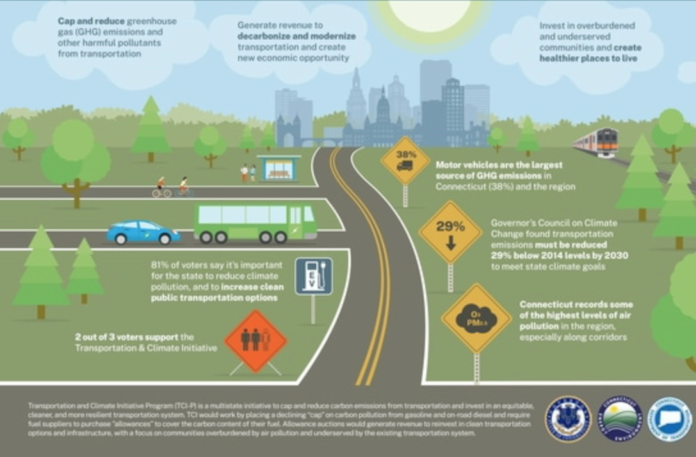The governors of Massachusetts, Connecticut and Rhode Island – and the mayor of the District of Columbia – have launched a multi-state program that addresses pollution while investing $300 million per year in cleaner transportation choices and healthier communities.
The bipartisan Transportation and Climate Initiative Program (TCI-P) will cut greenhouse gas pollution from motor vehicles in the region by an estimated 26% from 2022 to 2032, generate a total of more than $3 billion dollars over 10 years for the participating jurisdictions to invest in equitable, less polluting transportation options and to help energize economic recovery.
“Engaging in this way with my fellow governors and Mayor Bowser accomplishes goals we have set for Connecticut for years,” says Connecticut Gov. Ned Lamont. “Participating in the TCI-P will help grow our economy through a fresh injection of capital to provide for jobs and new infrastructure. This collaboration will cut our greenhouse gas emissions and will make our urban centers healthier after decades of being adversely impacted by the emissions being released by traffic every day. Connecticut has always taken pride in our leadership role when it comes to climate, and when we can combine that with a stronger economy, fast transit systems and regional cooperation, that’s a win for all of us.”
In an accompanying statement, eight other Northeast, Mid-Atlantic and Southeast states signaled that they will continue to work with Massachusetts, Connecticut, Rhode Island and the District of Columbia on the development of the details of the regional program while pursuing state-specific initiatives to reduce emissions and provide clean transportation solutions. As part of the TCI-P, Delaware, Maryland, New Jersey, New York, North Carolina, Pennsylvania, Vermont and Virginia have participated actively in developing the TCI-P and have the opportunity to join the program in the future. If all of the TCI jurisdictions eventually choose to implement the TCI-P, total proceeds available for investment could exceed $2 billion annually.
The memorandum of understanding (MoU) recently signed by Massachusetts, Connecticut, Rhode Island and the District of Columbia also includes a commitment to dedicate a minimum of 35% of each jurisdiction’s proceeds – nearly $100 million each year in the inaugural jurisdictions combined – to ensure that communities underserved by the transportation system and overburdened by pollution will benefit equitably from clean transportation projects and programs.
Transportation accounts for nearly 40% of greenhouse gas emissions in the Northeast and Mid-Atlantic region. Exposure to air pollution exacerbates lung and heart ailments, causes asthma attacks, and increases the risk of a stroke and other serious health conditions. Prolonged exposure to air pollution may make it more difficult to recover from diseases like COVID-19, according to a recent Harvard School of Public Health report.
TCI-P is projected to have significant public health benefits. If all TCI jurisdictions choose to implement the program, the estimated health benefits could include up to 300 deaths avoided each year and hundreds of childhood asthma cases avoided each year by 2032. Health benefits would exceed the cost of the program – TCI jurisdictions would see up to $3 billion worth of annual public health and safety benefits in 2032 if all jurisdictions implement the TCI-P.







